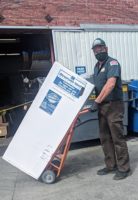In a new study conducted by Wisconsin Safety Council (WSC) and Rural Mutual Insurance Company, 85% of respondents said they “sometimes” or “often” see a coworker come to work sick even though he/she should have stayed home. In the current environment, exposure to sick coworkers is the leading safety concern for workers in Wisconsin. In Read more
Rural Mutual Insurance Company

In a new study conducted by Wisconsin Safety Council (WSC) and Rural Mutual Insurance Company, 85% of respondents said they “sometimes” or “often” see a coworker come to work sick even though he/she should have stayed home. In the current environment, exposure to sick coworkers is the leading safety concern for workers in Wisconsin.
In an effort to identify top workplace safety concerns and provide solutions during National Safety Month in June, WSC and Rural Mutual polled more than 180 WSC members, the majority of whom are safety professionals working in Wisconsin trades, including contractors, manufacturers and construction workers. The study was completed in April.
“Amidst the COVID-19 pandemic, we know businesses and organizations across the state are looking to create safer work environments now more than ever,” said Aaron Huebner, WSC executive director. “This study revealed safety professionals should focus on establishing initiatives that prevent the spread of infection and reduce exposure to employees who are sick.”
Business owners can protect their employees by taking business insurance that compensates their workers against workplace illnesses and other liability policies. Contrary to common belief, a business insurance policy does not protect the business and abandon its employees; it protects the employees just as much by offering compensation for injuries and health concerns that arise in the workplace.
Once a group of workers get infected while on the job, it is the employer’s duty to protect them and the rest of the workers by providing a suitable environment. Unaffected workers still need to do their jobs and have a right to do so in a suitable environment.
Simultaneously, it’s the affected workers’ prerogative to go back to work after receiving medical attention. It can only be possible for these to happen if a business has an insurance cover to indemnify its worker while protecting its practices.
Consequently, business insurance is a critical step in running your business while you, the employer, focus on your employees’ needs.
The respondents indicated several other top safety risks in the workplace:
- Interacting with hazardous materials (80%)
- Driving for work-related activities (80%)
- Standing for more than two hours in a row (79%)
- Working in high noise levels where a raised voice is needed to talk to people less than four feet away (76%)
A new, free e-book from Rural Mutual and WSC is now available to help safety professionals and trade workers in Wisconsin address these leading safety concerns. The ‘Work Safe in Wisconsin’ e-book offers easy to implement solutions for a safer and healthier workplace.
“Helping Wisconsin businesses lower their safety risks is a big part of Rural’s mission,” said Chris Schlechta, safety and loss control manager at Rural Mutual. “We’re excited to work with WSC to introduce the ‘Work Safe in Wisconsin’ e-book in hopes to inspire workers to jumpstart safety initiatives during National Safety Month and throughout the year.”
